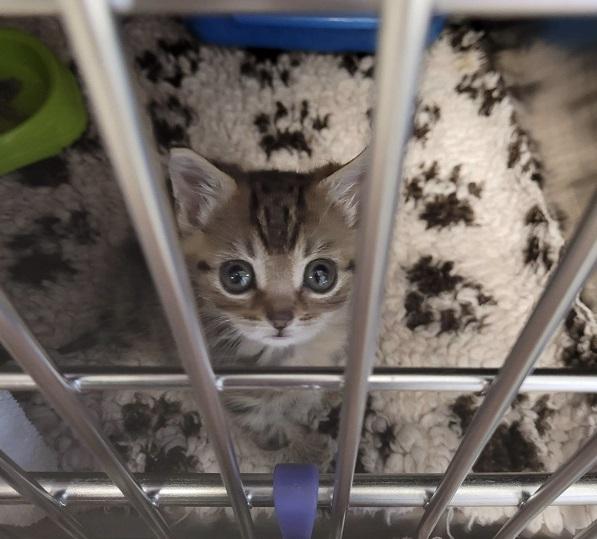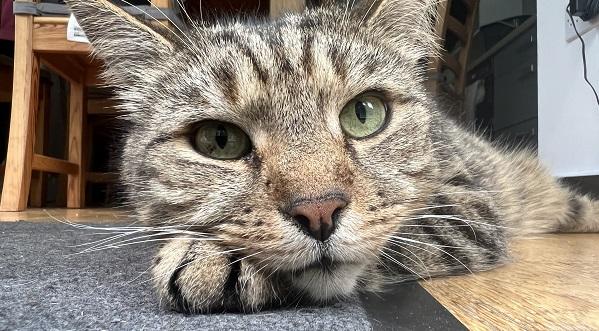Life-saving blood donation gives kitten new life
Local cat saves the day following emergency appeal for feline blood donors.

An abandoned kitten who was close to death due to severe anaemia is now thriving in his new forever home, following a life-saving blood transfusion from a fellow cat.
The young kitten, named Finn by clinical staff at the Royal (Dick) School of Veterinary Studies’ Hospital for Small Animals, quickly gained weight following the emergency treatment and is described as ‘full of mischief’ by his new owner.
The Hospital is now appealing to local cat owners in the Edinburgh area to consider registering their cat as a blood donor.
Severe anaemia
Finn was handed in to the Hospital for Small Animals late one Saturday night, after being found by a member of the public in their garden. When the young kitten was first examined, he was quiet and unresponsive. He weighed just 260 grams, less than half the expected weight of a kitten his age.
Blood tests revealed that the tiny kitten was severely anaemic and had a 4 per cent red blood cell count, a dangerously low level compared to the 25-45 per cent count seen in healthy cats. Vets concluded that his anaemia was probably due to the activity of the blood-sucking flea infestation he had.

Emergency transfusion
Finn required an emergency blood transfusion to survive. Unfortunately, unlike canine blood products that we can obtain from the Pet Blood Bank, for our feline patients we rely on local blood donors to donate blood when it’s required by a patient.
With no feline blood immediately available, the clinical team caring for Finn made an urgent appeal to cat owners in the area. Thankfully, a willing donor in the form of Hector, a 10-year-old domestic shorthaired cat, was found.
Hector’s donation of blood was a vital lifeline for Finn, who showed an immediate improvement following the transfusion.
Six days after being admitted and following a thorough flea treatment and lots of care from the clinical team, Finn was well enough to be discharged. He was adopted by one of the Hospitals’ emergency nurses who had helped care for him and quickly settled into his new forever home.
I first met Finn when he was carried in on a tiny blanket, collapsed and covered in fleas. I knew there was no guarantee he would survive but he was so small and in desperate need of help that I bonded to him quickly. Since coming home, he has continued to flourish is now a happy and healthy cat.
We were very happy to volunteer Hector and he loved all the cuddles and attention he received from the vets! It was such a quick and easy procedure for him, and we were delighted that his blood donation helped save the life of little Finn.
Feline Blood Donors
The Royal (Dick) School of Veterinary Studies’ Hospital for Small Animals Feline Blood Transfusion Unit are now looking for healthy cats in the local area that could be lifesaving blood donors.
We treat many critically ill feline patients at our hospital and at times these patients require a life-saving blood transfusion. We would love to increase the number of donor cats we have on file to help other cats in their time of need.
Donors should ideally be between 1-8 years old and weigh at least 4kg. Donor cats should be easy to handle and healthy, not on any medication and up to date with their vaccines, worming and flea treatments. Donor cats receive complimentary annual health checks, heart scans and blood tests and a bag of food after every donation.
If you would like to know more, or think your cat is a suitable candidate for blood donation, please contact the Hospital Transfusion Unit via hfsablooddonors@ed.ac.uk or call 0131 650 7650.
About the Royal (Dick) School of Veterinary Studies
The Royal (Dick) School of Veterinary Studies is a one-of-a-kind centre of excellence in clinical activity, teaching and research. Our purpose-built campus, set against the backdrop of the beautiful Pentland Hills Regional Park, is home to more than 800 staff and almost 1400 students, all of whom contribute to our exceptional community ethos.
The School comprises:
The Global Academy of Agriculture and Food Systems
The Hospital for Small Animals
The Jeanne Marchig International Centre for Animal Welfare Education
We represent the largest concentration of animal science-related expertise in Europe, impacting local, regional, national and international communities in terms of economic growth, the provision of clinical services and the advancement of scientific knowledge.


